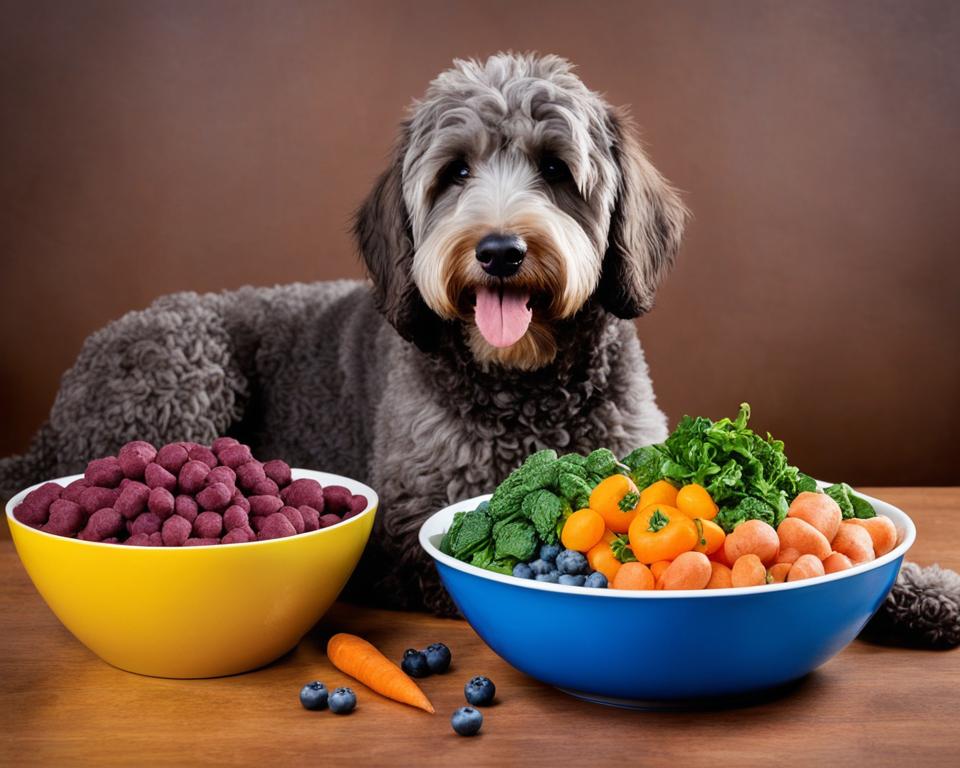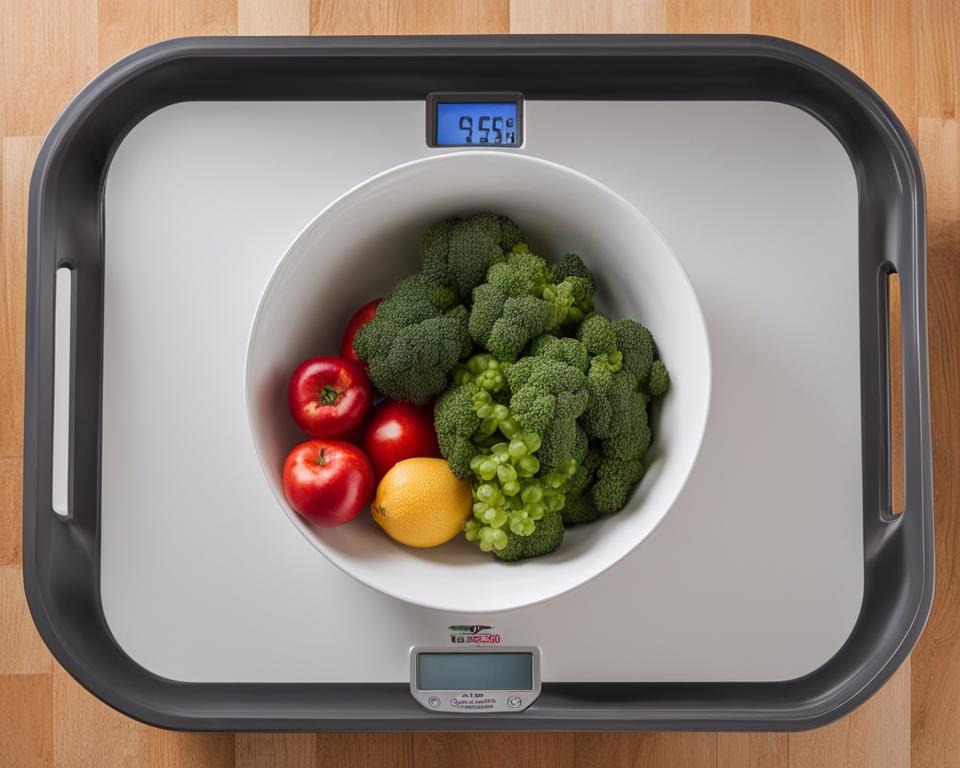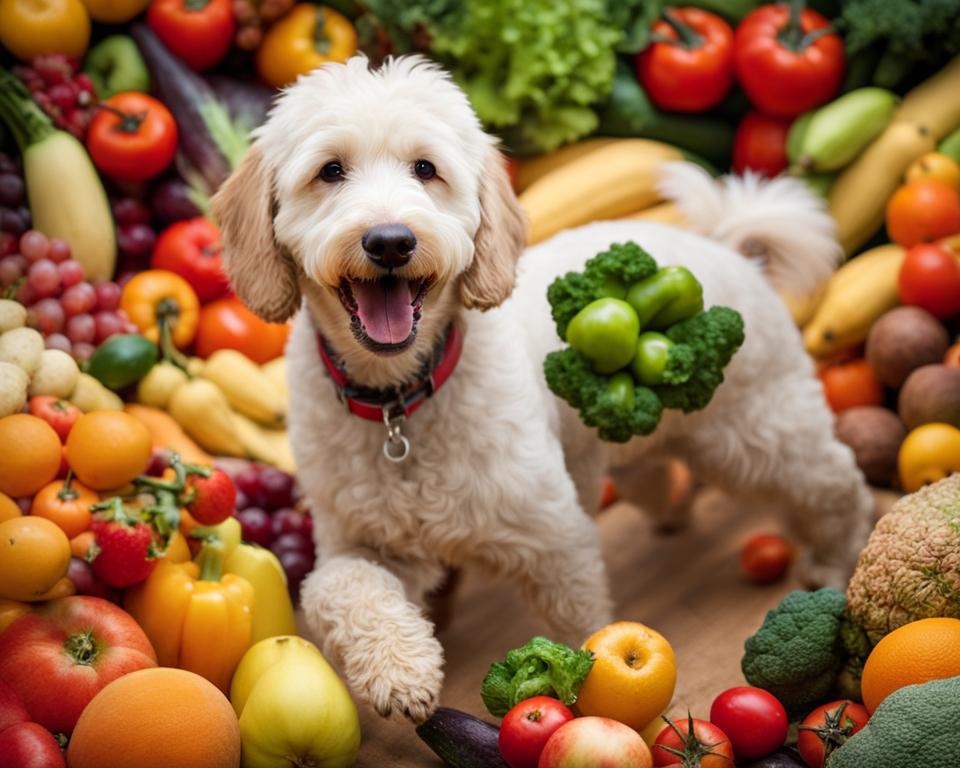Labradoodles require a nutritious and fulfilling diet to ensure their health and happiness. A good diet can extend their lifespan, repair body tissues, strengthen the immune system, and prevent health issues such as obesity, heart disease, and joint problems. Labradoodles have specific nutritional needs based on their age, size, and activity level. Labradoodle puppies require higher levels of protein and fat to support their growth, while senior dogs need high-protein foods to fuel their muscles. It is important to choose the right combination of nutrients, including protein, fat, complex carbohydrates, fiber, vitamins, minerals, and fatty acids, for a balanced diet.
Key Takeaways:
- Labradoodles need a nutritious diet to support their overall health and well-being.
- Their nutritional needs vary based on factors such as age, size, and activity level.
- Puppies require higher levels of protein and fat for growth, while seniors benefit from high-protein foods to support their muscles.
- Choosing the right combination of nutrients is crucial for a balanced diet.
- Avoiding ingredients that your Labradoodle is allergic to can prevent discomfort and promote overall health.
Labradoodle Nutritional Needs
When it comes to the nutritional needs of Labradoodles, a well-rounded diet is essential for their overall health and well-being. To support their growth and development, Labradoodle puppies require higher levels of protein and fat in their diet. On the other hand, senior Labradoodles benefit from high-protein foods to support their muscles as they age.
In order to meet their nutritional needs, a Labradoodle’s diet should consist of a balanced combination of nutrients. This includes 18% protein, 5% fat, and a variety of complex carbohydrates, fiber, vitamins, minerals, as well as omega-3 and omega-6 fatty acids.
The specific requirements for Labradoodles may vary based on factors such as their size and activity level. Larger, high-energy adult Labradoodles may require more calories to maintain their energy levels. It is important to consider these factors when planning a Labradoodle’s meal plan to ensure they receive the appropriate nutrients.
Take a look at the table below for a quick overview of the recommended nutritional needs for Labradoodles:
| Nutrient | Percentage of Diet |
|---|---|
| Protein | 18% |
| Fat | 5% |
| Complex Carbohydrates | Varied |
| Fiber | Varied |
| Vitamins | Varied |
| Minerals | Varied |
| Omega-3 Fatty Acids | Varied |
| Omega-6 Fatty Acids | Varied |
By providing your Labradoodle with a diet that meets their nutritional needs, you can ensure that they maintain optimal health and thrive throughout their life. Remember to consult with a veterinarian for personalized guidance and recommendations based on your Labradoodle’s specific needs.
Recommended Food for Labradoodles
When it comes to feeding your Labradoodle, there are several food options available that can meet their nutritional needs. Whether you prefer the convenience of commercial dog food or the natural approach of raw or fresh food diets, there is something for every Labradoodle. Each food option has its own benefits and considerations, so it’s important to choose what best suits your furry friend’s needs.
Commercial Dog Food
Commercial dog food is a popular choice for many Labradoodle owners. It offers convenience and usually provides clear instructions for different breeds and ages. When selecting a commercial dog food brand, look for ones that prioritize high-quality ingredients. Choose brands that list meat as the first ingredient and have the Association of American Feed Control Officials (AAFCO) label, ensuring that your Labradoodle gets the necessary nutrients for optimal health. Here is an example comparison table of the top recommended commercial dog food brands for Labradoodles:
| Brand | Key Features | Price Range |
|---|---|---|
| Brand A | – Meat as the first ingredient – Balanced nutrition – AAFCO approved |
$ |
| Brand B | – Grain-free options – High-quality ingredients – AAFCO approved |
$$ |
| Brand C | – Limited ingredient formulas – Allergen-friendly options – AAFCO approved |
$$$ |
Raw Diets
If you prefer a more natural approach, a raw diet could be a good fit for your Labradoodle. Raw diets consist of raw meats, vegetables, and healthy carbohydrates, providing a species-appropriate and nutrient-dense nutrition. This option aims to replicate what dogs would eat in the wild. As with any diet, it’s crucial to ensure a balanced meal plan, including the right proportion of proteins, fats, and carbohydrates. Consult with a veterinarian or a canine nutritionist to create a well-rounded raw diet plan for your Labradoodle.
Fresh Food Diets
Fresh food diets offer a combination of proteins, carbohydrates, vegetables, and organs, with all meats cooked thoroughly. These diets provide a balanced and wholesome approach to nutrition. Some dog owners prefer a combination of dry kibble with fresh ingredients to ensure their Labradoodle receives the benefits of both worlds. A variety of fresh food delivery services are available, providing pre-portioned meals tailored to your Labradoodle’s needs. Before choosing a fresh food diet, it’s essential to consider the cost, convenience, and dietary requirements of your Labradoodle.
When selecting the right food for your Labradoodle, it’s essential to consider their specific needs, such as age, size, activity level, and any dietary restrictions or allergies. What works for one Labradoodle may not work for another, so it may take some trial and error to find the perfect food match. Regular consultations with a veterinarian will help ensure your Labradoodle’s nutritional needs are met and contribute to their overall health and well-being.
Food Allergies
Labradoodles can develop food allergies, leading to symptoms such as rashes or skin irritations. It is crucial to be aware of these signs and take necessary steps to address them. Conducting an elimination diet can be helpful in identifying the specific allergens affecting your Labradoodle. Common canine allergies include beef, chicken, wheat, dairy, eggs, and soy.
If your Labradoodle is diagnosed with food allergies, it is important to make dietary adjustments. Choosing alternative protein sources or opting for grain-free dog food can help alleviate their discomfort. Some Labradoodles may benefit from homemade meals where every ingredient can be carefully monitored to avoid allergens.
Avoiding ingredients your Labradoodle is allergic to can promote overall health and well-being, providing them with a balanced and allergy-free diet.

| Allergen | Alternative Protein Sources | Grain-free Dog Food Brands |
|---|---|---|
| Beef | Lamb, venison, duck | Wellness CORE Grain-Free, Natural Balance L.I.D. |
| Chicken | Turkey, duck, salmon | Merrick Grain-Free, Acana Singles |
| Wheat | Quinoa, brown rice, oats | Blue Buffalo Basics, Nutro Limited Ingredient |
| Dairy | Coconut milk, goat’s milk | Wellness Simple, Natural Balance L.I.D. |
| Eggs | Whitefish, duck, rabbit | Canidae Pure, Zignature |
| Soy | Peas, lentils, chickpeas | Taste of the Wild Grain-Free, NutriSource Grain-Free |
Food Quantities
Proper food quantities play a crucial role in Labradoodle weight management and overall wellness. While most commercial dog foods provide feeding instructions, it is essential to consult a veterinarian for specific quantities tailored to your Labradoodle’s individual needs. Labradoodle puppies have different feeding requirements than adult dogs, and larger dogs may require more calories to maintain their energy levels. Monitoring your Labradoodle’s weight and adjusting the portions accordingly is key to preventing obesity and promoting a healthy weight.
| Labradoodle Age | Feeding Guidelines |
|---|---|
| Puppy (8-12 weeks) | 3-4 small meals of high-quality puppy food |
| Puppy (12-24 weeks) | 3 meals of high-quality puppy food |
| Puppy (24 weeks – 1 year) | 2 meals of high-quality puppy food |
| Adult (1-8 years) | 2 meals of high-quality adult dog food |
| Senior (8+ years) | 2 meals of high-quality senior dog food |
Remember that these guidelines are approximate and may vary depending on your Labradoodle’s metabolism, activity level, and overall health. Regularly monitoring their weight and consulting with a veterinarian can help you adjust the food quantities to ensure a healthy weight and prevent any potential health issues related to overfeeding or underfeeding.

Introducing new diets
When it comes to introducing a new diet to your beloved Labradoodle, taking a gradual approach is key to ensuring their digestive system remains in harmony. Start by incorporating a small portion of the new food into their current diet, and gradually increase the amount over the course of one to two weeks. By doing so, you allow your Labradoodle’s body to adjust to the new nutrients without causing any digestive disturbances.
During this transition period, it is important to closely monitor your Labradoodle’s reaction to the new diet. Pay attention to any signs of discomfort or adverse effects. If you notice any unusual symptoms, it is recommended to reach out to a trusted veterinarian for guidance. They can provide valuable insights and help address any concerns you may have during this transition.
Regular communication with your veterinarian is not only important during the introduction of a new diet but also throughout your Labradoodle’s health journey. They possess the expertise and knowledge needed to tailor a diet plan that suits your Labradoodle’s specific nutritional needs, promoting their overall well-being and vitality.
FAQ
What are the nutritional needs of Labradoodles?
Labradoodles require a diet that contains 18% protein, 5% fat, complex carbohydrates, fiber, vitamins, minerals, and omega-3 and omega-6 fatty acids. The specific nutritional needs may vary based on age, size, and activity level.
What are some recommended food options for Labradoodles?
Labradoodle owners can choose from commercial dog food, raw diets, fresh food diets, or a combination of dry kibble and fresh ingredients. It is important to choose high-quality brands that provide balanced nutrition and meet the specific needs of Labradoodles.
Are Labradoodles prone to food allergies?
Yes, Labradoodles can have food allergies. Common allergens include beef, chicken, wheat, dairy, eggs, and soy. Identifying food allergies and avoiding trigger ingredients is important for their overall health and well-being.
How much food should I feed my Labradoodle?
Feeding quantities vary based on age, size, and activity level. It is best to consult with a veterinarian to determine the appropriate portion sizes. Monitoring your Labradoodle’s weight and adjusting portions as needed is vital for weight management and overall wellness.
How do I introduce a new diet to my Labradoodle?
When introducing a new diet, it is important to do it gradually. Start by mixing a small portion of the new food with their current food and gradually increase the amount over one to two weeks. Monitor your Labradoodle’s reaction and consult with a veterinarian if any adverse effects occur.

Leave a Reply